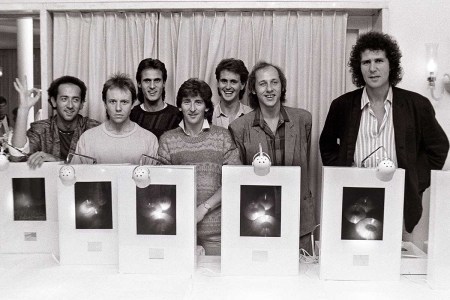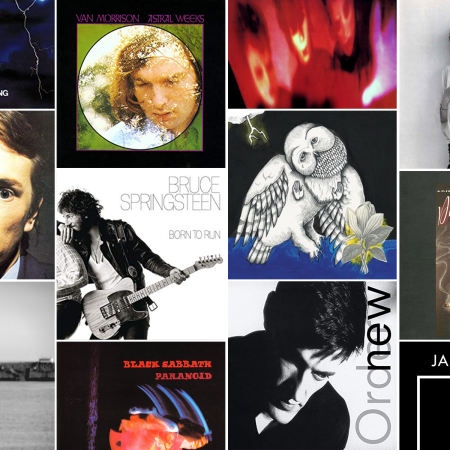What do ABBA, Billy Joel, the Bee Gees and Dire Straits have in common? Besides eliciting a condescending “Who?” response from anyone under 30, they are all classic rock and pop artists who helped usher in the compact disc (CD) era, which debuted in the United States on March 2, 1983 — 40 years ago today — when CBS Records released 16 titles in the burgeoning format.
The CD, co-created by Philips and Sony, had actually debuted earlier in 1981 when a test disc was manufactured in Germany. Later that year, a CD of the Bee Gees’ flop post-disco album Living Eyes was demonstrated on BBC TV. ABBA’s The Visitors was actually the first pop music album to be pressed at a factory, but it wouldn’t receive a release until later. In 1982, the format was commercially launched as a Digital Audio Compact Disc in Japan with the release of Sony’s CD player CDP-101 (described on that day as a “new digital record player, using laser beams” by United Press International) and a re-release of Billy Joel’s 52nd Street album.
But it was March of 1983 that saw the first compact discs hitting the U.S. market. Early CDs cost about $15, which CNN estimates was about $35 in 2012 money (when they did their compact disc retrospective). The first CD-only record label, Rykodisc, followed in January 1984. But the format really didn’t catch on domestically until 1985, when Dire Straits released their seminal album Brothers in Arms.
35 Years Ago, Dire Straits Physically Changed How We Listen to Music
The band’s 1985 smash hit “Brothers In Arms” was the flag-bearer of the compact disc eraProduced by Neil Dorfsman (Bruce Hornsby, Sting), Brothers in Arms was one of the first albums recorded digitally, via Sony’s 24-track digital tape machine. It won a Grammy for Best Engineered Recording, Non-Classical in 1986 and again in 2006 for Best Surround Sound Album after a reissue.
Arms was built for the digital compact disc world, and it was the first CD to sell a million copies, with a little help from a promotion by the format’s co-creator Philips. But that newfound success turned out to be a problem for some.
“When CDs took off with consumers in the years that followed [Rykodisc’s launch], many people thought we were pretty smart to do what we did in ’84,” remembers Rykodisc co-founder Robert Simonds. “Honestly, the fast growth of the CD almost killed us. See, we originally oriented Rykodisc to be for the audiophile, specialty market, which we all expected to be where the CD would be for its first 5-10 years at least. Within two years we were fighting to get our CDs manufactured because the entire worldwide manufacturing capacity was overwhelmed by demand for a single rock title (Dire Straits’ Brothers in Arms).”
“Considering its quality and size, the compact disc most certainly will become part of our everyday lives in the future,” Detroit NBC reporter Mort Crim noted in the above, hilariously fashioned 1985 clip. (From what some music fans can surmise, Tom Petty was the first artist to mention CDs in a song, on 1987’s “Think About Me.”)
The compact disc revolution peaked in 2000 when nearly a billion discs were shipped in the U.S. According to the Recording Industry Association of America (RIAA), CD album sales in the United States have dropped by 95% since that peak year, due primarily to the rise of music streaming services (and before that, Napster).
So, are we at the end of the compact disc era? Not quite. Even with streaming and the continued revival of vinyl — and, for some reason, cassettes — compact disc sales actually increased a bit in 2021, the first increase in CD sales since 2004. Hypebot attributed the recent rise to the idea that a CD is a physical souvenir that fans can cherish — and in genres like K-Pop, the packaging may be unique or collectible. It’s also a lot cheaper to produce than that other popular collectible format, vinyl.
So happy 40th (well, 40-ish) birthday to the compact disc, which hasn’t always had fans within the music industry. To quote Screeching Weasel (from their 1998 song “Compact Disc”): “That thing you’re listening to is a multi-flawed industry scam / Devoid of any thought or heart at all / It’s the antithesis of rock and roll / But no one cares that a record sounds better.”
Thanks for reading InsideHook. Sign up for our daily newsletter and be in the know.


















